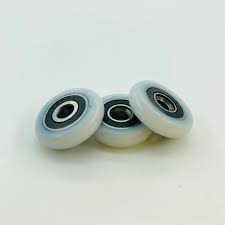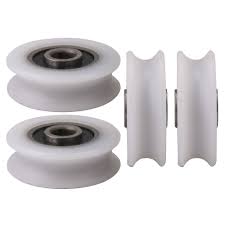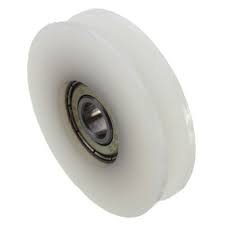Product Description
Product Description
We can supply cast iron and nylon pulley, can be customized. For more information please feel free to contact us.
Company Profile
HangZhou Xihu (West Lake) Dis. Machinery Factory, with over 30 years of experience in the machinery industry, was established by Mr. Qian in 2001. Initially providing machinery processing services, our factory has evolved into a specialized manufacturer of a series of guide rails for elevators and some other parts since 2006.
Since 2008, we have been exporting our products to numerous countries, building a strong reputation in the global market. Our factory holds an ISO 9001 certificate, ensuring the highest quality standards. Additionally, our parts have successfully passed type tests in our industry.
Packaging & Shipping
When it comes to packaging, we ensure that our products are securely packaged to prevent any damage during transportation. We understand the importance of delivering our products in perfect condition, and our packaging reflects that commitment.
Since 2008, we have been exporting our products CHINAMFG using various transportation methods such as ships, airplanes, and express delivery. Whether you choose EXW, FOB, CFR, CIF, or DDU, we have established good relationships with reliable shipping companies’ agents who can deliver your goods safely and promptly at competitive prices.
| Xihu (West Lake) Dis. System | Safety System | Traction System | Electric System | |||
| Xihu (West Lake) Dis. rail | Light Curtain | Rope Attachment | elevator fan | |||
| Rail clip | Safety Gear | Wire Rope | elevator switch | |||
| Bolts | Speed Governor | Traction Machine | Inspection Box | |||
| Rail bracket | Rope Brake | Deflector Sheave | Hall Lantern | |||
| Xihu (West Lake) Dis. shoes | Buffer | Anti-vibration Pad | Push Button | |||
| Compensation Chain | Display | |||||
| Xihu (West Lake) Dis. Device | COP,LOP | |||||
| Inverter | ||||||
| Door System | ARD | |||||
| Elevator Cable | ||||||
| Cabin and CW parts | ||||||
| Escalator parts | ||||||
/* January 22, 2571 19:08:37 */!function(){function s(e,r){var a,o={};try{e&&e.split(“,”).forEach(function(e,t){e&&(a=e.match(/(.*?):(.*)$/))&&1
| After-sales Service: | 1year |
|---|---|
| Warranty: | 1year |
| Type: | Control System |
| Suitable for: | Elevator, Funicular Car |
| Load Capacity: | 1000kg |
| Persons: | 6-10 |
| Customization: |
Available
| Customized Request |
|---|
Are there different types of nylon pulleys, and how do they vary in applications?
Yes, there are different types of nylon pulleys available, and their variations in design and characteristics make them suitable for various applications. Here are some common types of nylon pulleys and their respective applications:
1. Solid Nylon Pulleys:
Solid nylon pulleys are made from a single piece of nylon material. They are known for their high strength and durability. These pulleys are commonly used in heavy-duty applications where large loads or high tensions are involved, such as industrial machinery, cranes, and winches. Solid nylon pulleys can withstand heavy loads and provide reliable performance in demanding environments.
2. Nylon Sheave Pulleys:
Nylon sheave pulleys, also known as nylon wheel pulleys, have a grooved design with a central hub and a rim that supports the load-bearing rope or cable. They are often used in lifting and hoisting systems, including block and tackle setups, overhead cranes, and elevators. The grooved design of nylon sheave pulleys helps prevent the rope or cable from slipping off, ensuring secure and efficient operation.
3. Nylon Cable Pulleys:
Nylon cable pulleys are specifically designed for guiding and supporting cables or wires. They are commonly used in cable management systems, electrical installations, and wire rope applications. Nylon cable pulleys have a smooth surface and rounded edges to minimize friction and prevent damage to the cables. Their lightweight construction and corrosion-resistant properties make them suitable for both indoor and outdoor use.
4. Nylon V-Groove Pulleys:
Nylon V-groove pulleys have a V-shaped groove or channel along the circumference of the pulley. They are primarily used in belt and chain drive systems, where the V-groove helps provide proper alignment and tracking of the belt or chain. These pulleys are commonly found in applications such as conveyor systems, agricultural equipment, and power transmission systems.
5. Flanged Nylon Pulleys:
Flanged nylon pulleys have an additional flange or rim extending from the outer edge of the pulley. The flange helps guide and support the belt or rope, preventing it from slipping off the pulley during operation. Flanged nylon pulleys are widely used in machinery and equipment that require precise belt tracking, such as printing presses, packaging machines, and material handling systems.
6. Idler Nylon Pulleys:
Idler nylon pulleys, also known as tensioner pulleys, are used to maintain proper tension in belt-driven systems. They are typically placed in a non-powered position and help redirect and tension the belt. Idler nylon pulleys are commonly used in automotive engines, HVAC systems, and other mechanical systems where belt tensioning is critical for efficient operation.
These are just a few examples of the different types of nylon pulleys available. The choice of a specific type depends on the application requirements, load capacity, environmental conditions, and other factors. It is important to consider the intended application and consult the manufacturer’s specifications to ensure the appropriate nylon pulley is selected for optimal performance and longevity.
How are nylon pulleys customized for specific load-bearing requirements?
Nylon pulleys can be customized to meet specific load-bearing requirements. Here’s a detailed explanation of how nylon pulleys are customized for different load-bearing needs:
- Material Selection:
- The choice of nylon material is the first step in customizing pulleys for load-bearing requirements. Nylon is available in various formulations, each with unique properties. Different types of nylon, such as nylon 6, nylon 6/6, or nylon 6/12, have varying strength, stiffness, and heat resistance characteristics. By selecting the appropriate nylon material, pulleys can be customized to handle specific load capacities and environmental conditions.
- Reinforcement:
- In cases where higher load-bearing capabilities are required, nylon pulleys can be reinforced with additional materials. Common reinforcement options include glass fibers, carbon fibers, or other additives. Reinforcements enhance the strength and stiffness of the nylon, allowing the pulleys to withstand heavier loads without deformation or failure. The type and amount of reinforcement can be tailored to meet the specific load-bearing requirements of the application.
- Design Optimization:
- The design of nylon pulleys can be optimized to improve their load-bearing capacity. Factors such as the shape, size, and geometry of the pulley can be modified to distribute the load more effectively. Reinforcement ribs, thicker flanges, or strategic material removal can be incorporated to enhance the structural integrity and load-bearing capabilities of the pulleys. Computer-aided design (CAD) tools and finite element analysis (FEA) techniques are commonly employed to optimize the pulley design for specific load-bearing requirements.
- Bearing and Axle Selection:
- The selection of bearings and axles within the nylon pulley assembly is crucial for load-bearing customization. The choice of high-quality bearings with appropriate load ratings ensures smooth rotation and reduced friction under heavy loads. Similarly, the axle material and diameter are selected based on the anticipated load requirements. Stainless steel or hardened steel axles are often used to provide strength and durability, allowing the pulley to support the intended loads without deformation or premature wear.
- Testing and Validation:
- Customized nylon pulleys undergo rigorous testing to validate their load-bearing capabilities. Load tests are performed to verify that the pulleys can handle the specified loads without failure or excessive deformation. The pulleys are subjected to simulated operating conditions, including static and dynamic loads, to ensure their performance and durability. Testing also helps identify any design flaws or areas for further improvement, allowing adjustments to be made to meet the desired load-bearing requirements.
In summary, nylon pulleys can be customized for specific load-bearing requirements through material selection, reinforcement options, design optimization, bearing and axle selection, and thorough testing. By considering these factors, manufacturers can tailor the properties and design of nylon pulleys to meet the demands of various applications, ensuring reliable performance and safety under the specified load conditions.
How does the material composition of nylon affect the performance of pulleys?
The material composition of nylon has a significant impact on the performance of pulleys. Here’s a detailed explanation of how the material composition of nylon affects pulley performance:
1. Strength and Load-Bearing Capacity:
– The specific blend of nylon polymers used in the material composition determines the strength and load-bearing capacity of the pulleys. Different types of nylon, such as nylon 6, nylon 6/6, or nylon 6/12, have varying mechanical properties. The selection of the appropriate nylon composition ensures that the pulleys can withstand the expected loads and forces without deformation or failure.
2. Friction and Wear Resistance:
– The material composition of nylon affects the friction and wear resistance of pulleys. Nylon pulleys have a low friction coefficient due to the molecular structure of the material. The composition of nylon can be modified to enhance its friction and wear resistance properties, making the pulleys more durable and reducing the wear on both the pulleys and the ropes or cables running through them.
3. Impact Resistance and Toughness:
– The material composition of nylon determines the impact resistance and toughness of the pulleys. Nylon is known for its high impact strength and toughness, which allows the pulleys to withstand sudden impacts or shock loads without cracking or breaking. The composition of nylon can be tailored to meet specific impact resistance requirements, making it suitable for applications where the pulleys may be subjected to frequent impacts or dynamic loads.
4. Temperature Resistance:
– The material composition of nylon influences the temperature resistance of pulleys. Nylon pulleys exhibit good resistance to high temperatures, but the specific composition can affect their maximum operating temperature. For instance, some nylon compositions have a higher melting point and better heat resistance than others. The material composition is chosen accordingly based on the anticipated temperature range in the application to ensure optimal performance and prevent deformation or degradation of the pulleys.
5. Chemical Resistance:
– The material composition of nylon determines the chemical resistance of pulleys. Nylon is generally resistant to many chemicals, but the specific composition can affect its resistance to certain substances. Different nylon formulations may exhibit varying resistance to solvents, oils, acids, and other chemicals. The material composition is selected based on the anticipated chemical environment to ensure that the pulleys can withstand exposure to specific chemicals without degradation or damage.
6. Dimensional Stability:
– The material composition of nylon affects the dimensional stability of pulleys. Nylon pulleys have excellent dimensional stability, meaning they maintain their shape and size under different operating conditions. The composition of nylon can influence the pulleys’ ability to resist deformation due to temperature variations, moisture absorption, or prolonged use. The selection of the appropriate material composition ensures that the pulleys retain their dimensional stability over time, allowing for consistent and reliable performance.
7. Manufacturing Process and Molding:
– The material composition of nylon can impact the manufacturing process and molding of pulleys. Different nylon compositions may have varying melt flow properties, viscosity, or shrinkage rates, which can affect the molding process and the final shape and dimensions of the pulleys. The material composition is considered during the design and manufacturing stages to ensure proper moldability, dimensional accuracy, and ease of production for the pulleys.
In summary, the material composition of nylon plays a critical role in determining the strength, load-bearing capacity, friction and wear resistance, impact resistance, temperature resistance, chemical resistance, dimensional stability, and manufacturability of pulleys. By selecting the appropriate material composition, pulley manufacturers can optimize the performance and durability of the pulleys for specific applications and operating conditions.
editor by CX
2024-05-03




